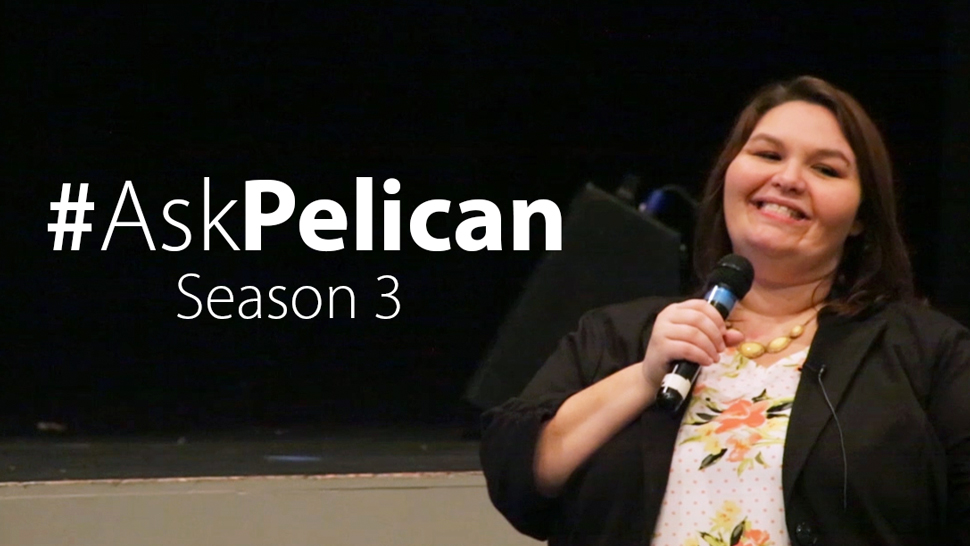Where does the time go?
We have now wrapped up three seasons of #AskPelican, and the appreciation we have for our readers, subscribers, and viewers can’t be overstated. This series of videos and blogs is made possible by you!
The #AskPelican series has become a hit since its launch in 2017. The questions our team members answer are sent in via our #AskPelican question form and in person during our Financial Wellness Workshops. We feel that this direct interaction with our members and subscribers is invaluable.
Season three features Pelican’s Director of Financial Outreach, Jessica Sharon, covering a multitude of financial topics.
Here are the questions she answered in season three of #AskPelican:
How Do I Buy a Car (the Right Way)?
The first thing that you want to do is research. Next to purchasing your home, purchasing a vehicle is the most money you’re probably going to spend on a large purchase. And, if you have to purchase one, especially if you’re in a very tight situation—maybe a tight money situation or time situation—you may not do the research that you need. And then you’re not going to get the best deal.
[Ask yourself] Are you going to buy new or used? Is that car holding its value? Is it worth what they’re selling it for? It’s really, really important to make sure that you’re getting the best value.Research the type of vehicle that you want.
Determine the amount of money you want to spend on your vehicle. How much are you willing to pay every month for a car note? More importantly, how is that going to fit in your budget?
Decide on the gadgets that you want to have; decide the things that are important to you.
Calculate your expected gas mileage. Are you going to get a very gas-efficient car? Do you have to travel really far?
And then ask yourself: “Will this vehicle meet my needs over time?”
What are you doing long-term so that you can have what you need?
What are the Pros and Cons of Buying a New Vehicle?
Pros:
New cars come with a manufacturer’s warranty of at least three years or 36,000 miles. That’s awesome! For some people, especially if you’re on a fixed income, a warranty may be a really important thing to have.
A new car will likely have the latest safety, comfort, and convenience features.
There are no surprises—you’re the first owner.
Cons:
It’s going to cost significantly more than a three-year-old used car. And, it’s going to lose 25 to 40 percent of its value that you put into it the moment you drive it off the lot.
If you’re buying a new car, it’s really important to put more down or to have a lot of money on a trade-in because you want to help negate the fact that you’re losing that value from taking that car off the lot.
Insurance costs can be significantly higher, because if you have to have a loan on the car, you’re going to be required to have full coverage insurance.
Car shopping?
Check out our post here for advice and questions to ask yourself to determine whether or not you can afford a new car!What are the Pros and Cons of Buying a Used Vehicle?
Pros:
Used vehicles; significantly cheaper. It lost all that value when we drove it off the lot so we can pay less for it.
Lower insurance costs (in most cases)—depending on what you buy.
The rate of depreciation over time will be less than the first two years. They definitely hold their value because they’ve already had that significant drop in value.
Cons:
Questionable maintenance. Did they take care of it?
No new car warranty. Now, you could be able to get an extended warranty, and I think it’s very important to have especially, again, if you have a fixed income.
Higher maintenance costs as it nears 100,000 miles. What needs to be replaced on that car? Make sure that you have an idea before you purchase it.
Fewer safety and convenience features than a new vehicle.
Don’t forget about certified pre-owned cars!
You can make every dollar count when you’re buying a car, and here are all the benefits of buying a rental car.What Are the Pros and Cons of Leasing a Vehicle?
Pros:
You have lower monthly payments.
Little or no down payment.
You have lower sales tax because it’s only paid on the amount of the car’s value used over three years.
Cons:
There are mileage limitations. That can cause additional fees when you go to trade it in.
Leasing is always more expensive than long-term buying when you look at the big picture.
You never own the vehicle outright and once the lease ends you have to either purchase it or find another one and lease that.
Why Should I Get Pre-Approved for an Auto Loan?
Getting approved for an auto loan. This is one of the major keys to buying a car.
When you walk into a dealership and say I am paying cash, you just won. And you won because they lost all of their finance bargaining value. When you have the power to negotiate, you will win.
The most important thing is having that bargaining value—when you get pre-approved for a car, you’re walking in and saying “I’m paying cash.”
How Does My Credit Score Affect My Car Buying Experience?
It’s really important that if you have a low credit score, you could be denied for an auto loan. Go in informed. If you’re not going to get pre-approved, print out your annual credit report from annualcreditreport.com. Know what your credit score is walking in.
Your auto insurance premium is also determined by your credit score. That is why it is so important—you have to mind your credit.
If you have good credit, research local financial institutions to determine which lender will give you the best rate.
Loan-to-value is really important.
What you have to realize is that, when we determine how much we’re going to lend you, it’s based on how good your credit score is.
The higher your credit score, the more opportunity you have to get a larger amount for your loan to get you where you need to be.
Credit score helps you get the best deal.
Do I Need GAP Insurance on a Car?
If you’re not putting a lot down on the car, GAP insurance is really important. I have seen far too many times people get into an accident that is not their fault. And their car is totaled, and if they didn’t have GAP, they can’t cover it.
If you’re putting a good bit of money down on the car, then it’s not necessary. Just remember that you’ve got to take a look at that.
What is the Term of an Auto Loan?
The term of your auto loan—they’re typically financed for five years. Depending on the car’s age and mileage, you may be able to extend it. But when you think about that, think about the useful life of the vehicle. Do you want to pay seven years on something that you’re going to trade in in four?
Depending on the type of vehicle you buy, make sure that you’re looking at a term that makes sense.
Think about how you’re going to be using the vehicle. Make sure that the term makes sense for you.
Do you have any questions you’d like to see us answer in an upcoming season? Comment below and let us know!
Once a Pelican State CU member, always a member—through life’s milestones, we’ll always be there to help you with your financial needs. Your Financial Family for Life. Give us a call at 800-351-4877.



